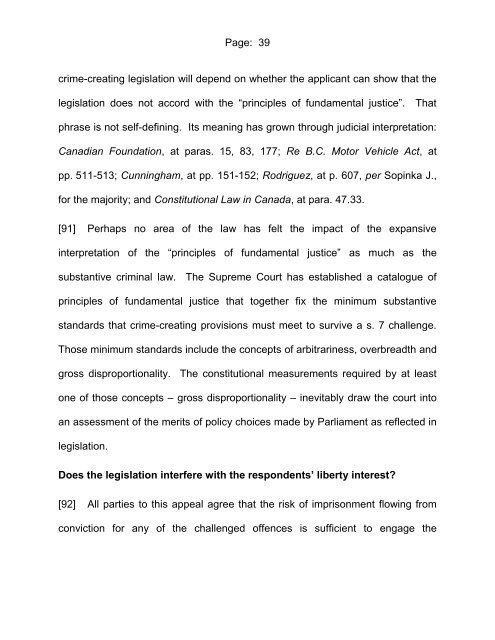Page: 38right to life, liberty and security of the person: <strong>Canada</strong> (Minister of Employmentand Immigration) v. Chiarelli, [1992] 1 S.C.R. 711; Cunningham v. <strong>Canada</strong>,[1993] 2 S.C.R. 143; Canadian Foundation for Children, Youth and the Law v.<strong>Canada</strong> (<strong>Attorney</strong> <strong>General</strong>), 2004 SCC 4, [2004] 1 S.C.R. 76; Malmo-Levine;<strong>Canada</strong> (<strong>Attorney</strong> <strong>General</strong>) v. PHS Community Services Society, 2011 SCC 44,[2011] 3 S.C.R. 134; R. v. Parker (2000), 49 O.R. (3d) 481 (C.A.); and P.W.Hogg, Constitutional Law of <strong>Canada</strong>, 5th ed., looseleaf (Toronto: Carswell,1996), at para. 47.20. Legislation that limits the right to life, liberty and security ofthe person will attract s. 7 scrutiny. It will, however, survive that scrutiny andavoid judicial nullification unless it is shown to be contrary to the principles offundamental justice.[89] An applicant alleging a breach of s. 7 must demonstrate on the balance ofprobabilities that: (1) the challenged legislation interferes with or limits theapplicant‟s right to life, or the right to liberty, or the right to security of the person;and (2) that the interference or limitation is not in accordance with the principlesof fundamental justice.While non-compliance with s. 7 can theoretically bejustified under s. 1 of the Charter, in reality s. 1 will rarely, if ever, trump a s. 7infringement: R. v. D.B., 2008 SCC 25, [2008] 2 S.C.R. 3, at para. 89.[90] Criminal Code sections which create crimes, like those challenged on thisapplication, interfere with the liberty interest in that they are potentiallypunishable by imprisonment. Consequently, the outcome of a s. 7 challenge to
Page: 39crime-creating legislation will depend on whether the applicant can show that thelegislation does not accord with the “principles of fundamental justice”. Thatphrase is not self-defining. Its meaning has grown through judicial interpretation:Canadian Foundation, at paras. 15, 83, 177; Re B.C. Motor Vehicle Act, atpp. 511-513; Cunningham, at pp. 151-152; Rodriguez, at p. 607, per Sopinka J.,for the majority; and Constitutional Law in <strong>Canada</strong>, at para. 47.33.[91] Perhaps no area of the law has felt the impact of the expansiveinterpretation of the “principles of fundamental justice” as much as thesubstantive criminal law. The Supreme Court has established a catalogue ofprinciples of fundamental justice that together fix the minimum substantivestandards that crime-creating provisions must meet to survive a s. 7 challenge.Those minimum standards include the concepts of arbitrariness, overbreadth andgross disproportionality. The constitutional measurements required by at leastone of those concepts – gross disproportionality – inevitably draw the court intoan assessment of the merits of policy choices made by Parliament as reflected inlegislation.Does the legislation interfere with the respondents’ liberty interest?[92] All parties to this appeal agree that the risk of imprisonment flowing fromconviction for any of the challenged offences is sufficient to engage the
- Page 1 and 2: BETWEENCOURT OF APPEAL FOR ONTARIOC
- Page 3 and 4: Page: 3ContentsBACKGROUND .........
- Page 5 and 6: Page: 5(3) Is the living on the ava
- Page 7 and 8: Page: 7principles of fundamental ju
- Page 9 and 10: Page: 9BACKGROUNDThe parties[10] Te
- Page 11 and 12: Page: 11212. (1) Every one who…(j
- Page 13 and 14: Page: 13makes it illegal for a pros
- Page 15 and 16: Page: 15cross-examination on some o
- Page 17 and 18: Page: 17the definition of “common
- Page 19 and 20: Page: 19In conclusion, these three
- Page 21 and 22: Page: 21[40] Turning to the ban on
- Page 23 and 24: Page: 23THE GOVERNMENTS’ APPEAL[4
- Page 25 and 26: Page: 25application judge and now p
- Page 27 and 28: Page: 27found that the liberty infr
- Page 29: Page: 29analyses that have applicat
- Page 32: Page: 32Section 2(b): What did the
- Page 35 and 36: Page: 35[79] Clearly, Swinton J. di
- Page 37: Page: 37right to expect that they m
- Page 41 and 42: Page: 41Siemens v. Manitoba (Attorn
- Page 43 and 44: Page: 43fundamental component of pe
- Page 45 and 46: Page: 45steps that could reduce the
- Page 47 and 48: Page: 47interest.The appellants mai
- Page 49 and 50: Page: 49[110] We examine the releva
- Page 51 and 52: Page: 51[114] We find support for o
- Page 53 and 54: Page: 53application judge, many pro
- Page 55 and 56: Page: 55in which, the respondents c
- Page 57 and 58: Page: 57findings of fact. The chara
- Page 59 and 60: Page: 59arbitrariness, overbreadth
- Page 61 and 62: Page: 61parties, she did not engage
- Page 63 and 64: Page: 6360.2(f); R. v. Sharpe, 2001
- Page 65 and 66: Page: 65inconsistency, or a more ex
- Page 67 and 68: Page: 67[152] The appellants seize
- Page 69 and 70: Page: 69[158] The appellants frame
- Page 71 and 72: Page: 71sufficient to establish ind
- Page 73 and 74: Page: 73[169] To conclude on this p
- Page 75 and 76: Page: 75[175] Bawdy-houses were ini
- Page 77 and 78: Page: 77[181] The phrase relied upo
- Page 79 and 80: Page: 79Viewed in historical perspe
- Page 81 and 82: Page: 81real connection to the obje
- Page 83 and 84: Page: 83However, we have concluded
- Page 85 and 86: Page: 85[206] Given the importance
- Page 87 and 88: Page: 87many vulnerabilities, stree
- Page 89 and 90:
Page: 89declaration of invalidity o
- Page 91 and 92:
Page: 91case law that has interpret
- Page 93 and 94:
Page: 93[226] The first device was
- Page 95 and 96:
Page: 95(c) The Barrow restriction[
- Page 97 and 98:
Page: 97(2) Objective of the living
- Page 99 and 100:
Page: 99[242] The fact that the eff
- Page 101 and 102:
Page: 101[247] The case for a blank
- Page 103 and 104:
Page: 103(5) Is the living on the a
- Page 105 and 106:
Page: 105From a review of Committee
- Page 107 and 108:
Page: 107Carol Rogerson in "The Jud
- Page 109 and 110:
Page: 109s. 212(1)(j) by reading in
- Page 111 and 112:
Page: 111company of, a prostitute i
- Page 113 and 114:
Page: 113[282] At para. 277 of her
- Page 115 and 116:
Page: 115and core societal values,
- Page 117 and 118:
Page: 117unwelcome solicitation of
- Page 119 and 120:
Page: 119[295] Weighing these facto
- Page 121 and 122:
Page: 121context, those expressions
- Page 123 and 124:
Page: 123[307] While street prostit
- Page 125 and 126:
Page: 125application judge relied o
- Page 127 and 128:
Page: 127comparable to the impact o
- Page 129 and 130:
Page: 129exacerbate the claimant‟
- Page 131 and 132:
Page: 131CONCLUSION[325] For the re
- Page 133 and 134:
Page: 133MacPherson J.A. (Dissentin
- Page 135 and 136:
Page: 135provisions are. To illustr
- Page 137 and 138:
Page: 137[344] The point I draw fro
- Page 139 and 140:
Page: 139street prostitutes from Va
- Page 141 and 142:
Page: 141and afraid to report abuse
- Page 143 and 144:
Page: 143the violence faced by stre
- Page 145 and 146:
Page: 145these provisions was start
- Page 147 and 148:
Page: 147their efforts to work coll
















